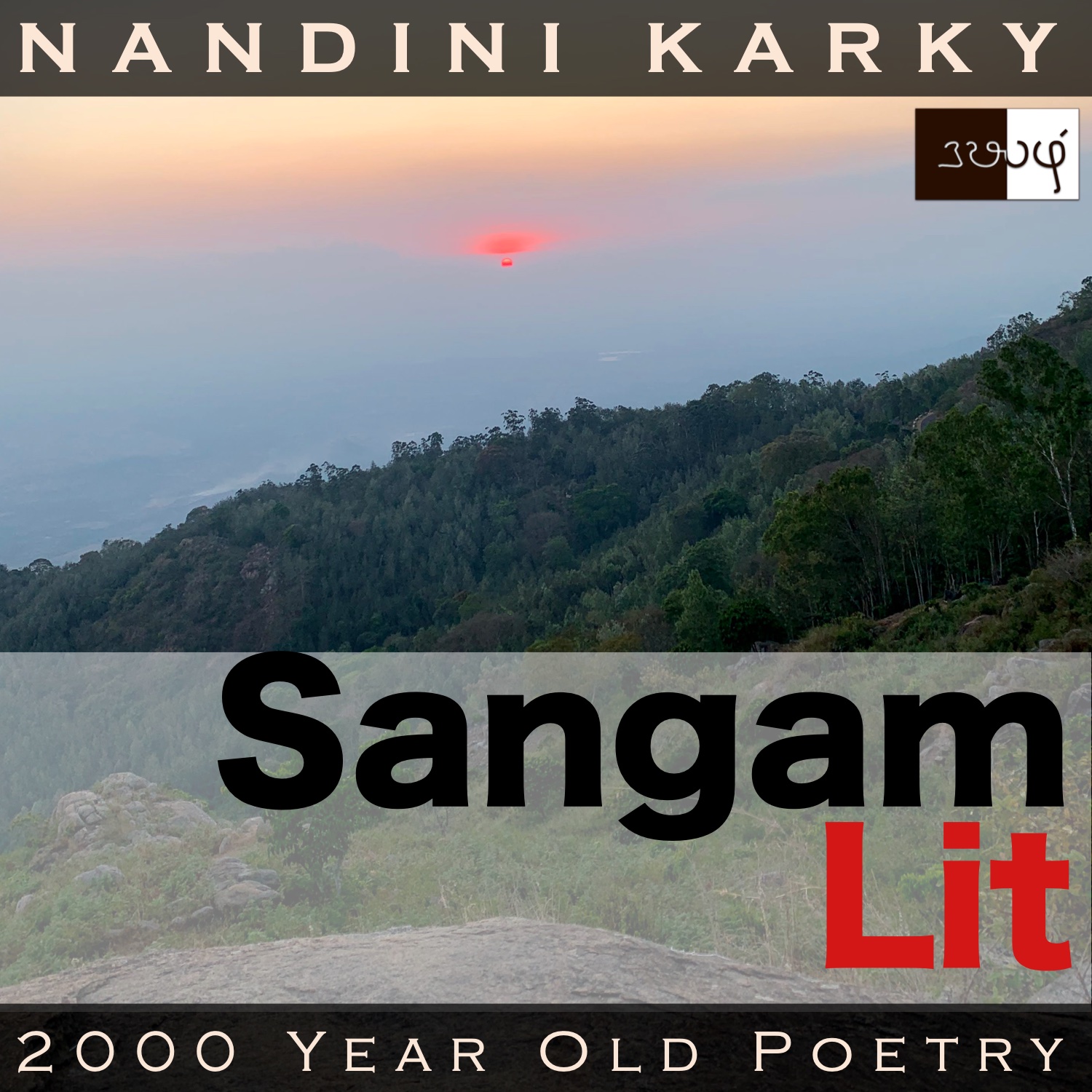Podcast: Play in new window | Download
Subscribe: Apple Podcasts | Spotify | Amazon Music | Android | iHeartRadio | TuneIn | RSS | More

In this episode, we perceive the clarity in a lady’s mind, as depicted in Sangam Literary work, Kurunthogai 203, penned by Nedumpalliyathanaar. Set in the farmlands of ‘Marutham’, the verse speaks in the voice of the lady to the confidante, expressing her inability to accept the man’s request at reconciliation.
மலை இடையிட்ட நாட்டரும் அல்லர்;
மரந்தலை தோன்றா ஊரரும் அல்லர்;
கண்ணின் காண நண்ணுவழி இருந்தும்,
கடவுள் நண்ணிய பாலோர் போல,
ஒரீஇனன் ஒழுகும் என்னைக்குப்
பரியலென்மன் யான், பண்டு ஒரு காலே.
‘So close, yet so far’ is the subtle thought in this one. The verse opens with the words ‘மலை இடையிட்ட நாட்டர்’ meaning ‘a person who belongs to a country separated by mountains’ and brings up this interesting way of looking at boundaries between nations. Next, we glance at the phrase ‘மரந்தலை தோன்றா ஊரர்’ meaning ‘a person who belongs to a town, whose trees are not seen’ and highlights how the boundaries of a town were seen by these ancients. ‘கண்ணின் காண நண்ணுவழி’ meaning ‘visible to the eyes and able to reach quickly’ talks about someplace close. In ‘கடவுள் நண்ணிய பாலோர்’ meaning ‘hermits who seek god’, we perceive mention of ascetics in the Tamil country. Ending with the words ‘பண்டு ஒரு காலே’ meaning ‘once upon a time’, the verse intrigues our curiosity.
A verse that seems to have much to say about space. The context reveals that the man and lady were leading a married life when the man took to keeping the company of courtesans. The lady is anguished by the man’s behaviour. After a while, the man realises his mistake and intending to reconcile with the lady, seeks out the confidante’s help. When the confidante takes his request to the lady, the lady says, “Neither does he come from a country separated by mountains, nor does he come from a town whose tree tops are out of sight. Although he lives near enough for me to see and for him to arrive thither quickly, akin to ascetics, who seek god, he has cast me aside. Long before, my heart indeed, melted for him in love.” With these words, the lady gives word to the hurt she feels within, by the man’s actions, and refuses to allow him entry to their house.
What is the specific thing about the man’s actions that has made the lady so hurt? To understand, let’s follow her words closely. The lady starts by talking about the man in negatives. That is, she talks about who he is not, or to be more exact, from where he doesn’t come. She says the man does not belong to some faraway land, separated by mountain peaks. Then she tells us, not just that, he doesn’t even come from a town, at some distance, such that you can’t see the trees that belong there. I want to pause a moment here and see the way space exists in the minds of these Sangam people. If mountains intervened, then it’s a different country and if you can’t see the trees of a town from where you live, that’s a different town. In their eyes, mountains seemed to stand tall as immutable, majestic elements that separated lands. Next, is the way trees are characteristic of a town’s boundaries. In another Sangam verse too, a man returning from his travel delights when he sees the trees that belong to his particular town. Rather than random, man-made lines that seem to keep inviting trouble between nations, this seems to be an elegant way of defining space. But the human race has grown beyond trees and mountains and ventured into outer space, making it unlikely that these boundaries will satisfy them any longer. Still, if we only learn to sense the awe of the ancients towards those rising peaks and soaring trees, that will do!
Returning to the verse, we find the lady continuing her words about the man saying, indeed he lives close enough for me to see and can reach me in a moment. While that may be so, he prefers to cast me aside, like how the ascetics, whose only goal is god, let go of all worldly attachments. She follows these words with a final punch saying, ‘I cared for him, once long before’. Isn’t the past tense the saddest version of all verbs indicating love? Whether the lady will find it in her heart to forgive or whether she will hold fast to this feeling, this moment of clarity to put into words what the heart feels is to be celebrated, no doubt!




Share your thoughts...